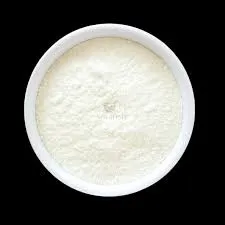
Dec . 06, 2024 15:40 Back to list
hpmc thickener
Exploring HPMC Thickener A Versatile Additive in Various Industries
Hydroxypropyl Methylcellulose (HPMC) is a cellulose derivative that has gained significant popularity as a thickening agent across a range of industries, including pharmaceuticals, food production, construction, and personal care. Its multifunctional properties make HPMC an essential additive that enhances the texture, stability, and overall quality of various products. This article delves into the advantages, applications, and production of HPMC thickener, highlighting its role in modern formulations.
HPMC is a non-ionic, water-soluble polymer derived from cellulose, which is obtained naturally from plant sources. Its unique structure allows it to dissolve in water and form a gel-like consistency. The viscosity of HPMC solutions can be manipulated by altering the concentration and molecular weight of the polymer, making it adaptable for different needs. One of the primary benefits of HPMC thickener is its ability to create smooth, uniform textures in diverse formulations, leading to enhanced product performance and consumer satisfaction.
Exploring HPMC Thickener A Versatile Additive in Various Industries
The food industry also heavily employs HPMC as a thickening and gelling agent. Although considered a safe ingredient (generally recognized as safe - GRAS), its application spans across food products ranging from sauces and dressings to dairy and dessert items. HPMC enhances mouthfeel and stabilizes emulsions, ensuring that food products maintain their desired consistency throughout their shelf life. Notably, HPMC is also favored in gluten-free products as it mimics the structural properties of gluten, providing a desirable texture without the presence of wheat.
hpmc thickener

In the construction sector, HPMC acts as a critical additive in cement-based materials like tile adhesives, joint fillers, and renders. It enhances water retention, improves workability, and contributes to a longer open time for application. By ensuring adequate adhesion and flexibility, HPMC helps create durable and effective building materials that withstand various environmental challenges.
The personal care products industry also benefits significantly from HPMC. It appears in shampoos, conditioners, lotions, and creams, where it helps to thicken formulations, enhance stability, and improve texture. Moreover, HPMC is widely used for its film-forming properties, which allow for better product performance, especially in hair care applications.
The production of HPMC involves a meticulous process where cellulose is derivatized through chemical reactions with propylene oxide and methyl chloride. This allows manufacturers to tailor the properties of HPMC to meet specific application requirements. Quality control is critical during this process, as the purity and viscosity of HPMC can directly influence its performance in end products.
In conclusion, HPMC thickener is a remarkable and versatile ingredient used in a myriad of applications across multiple industries. Its ability to enhance viscosity, stabilize formulations, and improve textures makes it indispensable in today's market. As consumers continue to demand higher quality and functionality from products, the significance of HPMC and similar additives is set to grow. Industries that leverage the unique properties of HPMC are likely to remain competitive, innovative, and responsive to consumer needs in an ever-evolving landscape. Whether in pharmaceuticals, food, construction, or personal care, HPMC thickener is indeed an ingredient that supports progress and quality across various domains.
-
Unlocking the Benefits of HPMC Products: A Gateway to Versatile Applications
NewsAug.07,2025
-
Unleashing the Potential of HPMC Ashland: A Comprehensive Look
NewsAug.07,2025
-
Tile Bonding Cellulose: The Key to Superior Adhesion and Durability
NewsAug.07,2025
-
Hydroxypropyl Methylcellulose Powder: The Versatile Component in Modern Pharmaceuticals
NewsAug.07,2025
-
Hydroxyethyl Cellulose: The Versatile Solution for Various Industries
NewsAug.07,2025
-
Hydroxyethyl Cellulose (HEC): The Versatile Polymer for Various Applications
NewsAug.07,2025







